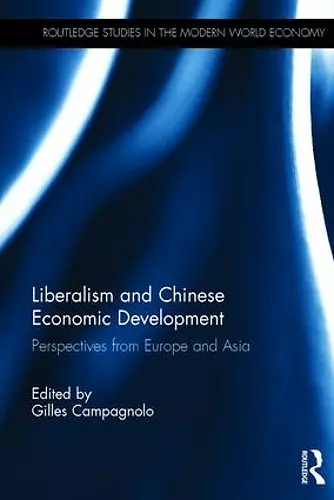Liberalism and Chinese Economic Development
Perspectives from Europe and Asia
Format:Hardback
Publisher:Taylor & Francis Ltd
Published:9th May '16
Currently unavailable, and unfortunately no date known when it will be back
This hardback is available in another edition too:
- Paperback£26.99(9780367668396)

Liberalism and Chinese Economic Development brings international contributors together in order to consider economic, political, social and legislative aspects of China’s modernization. This volume explores how liberalism is received and perceived, and whether it is adapted or adopted upon the basis of centuries of Chinese civilization and decades of capitalism.
China’s role in the global economy is an undeniable force. This book examines both historical and contemporary dimensions surrounding the question of Chinese liberalism, exploring China’s economic development in a comparative context. In particular, this text explores differences with the Western model, and more specifically, the relationship between Chinese economic thought and European traditions. This text assesses China’s economic development at both a macro and a micro level, and also considers its relationship with its neighbours.
Campagnolo answers whether free-trade and capitalistic economic developments are long sustainable without other types of liberal developments? Or is the idea that political liberties and economic freedom are just Western ideologies? This is a uniquely wide ranging book, suitable for scholars of the Chinese economy, the history of economic thought, economic philosophy and international political economy.
'The book provides conceptual tools to reach an answer within a Chinese environment, both Confucian and firmly ruled by the Chinese Communist Party. The underlying tension among these factors makes the book’s analysis uniquely wide-ranging.' — Aix-Marseille School of Economics
‘Liberalism and Chinese Economic Development’ is a multidisciplinary and multi-sided book, centered on a number of questions that are rarely posed with respect to the future ‘destiny’ of such an extraordinary experience in industrialization and development. In her review of the book Stefania Jaconis analyses the connections brought out by the authors (economists and political scientists, philosophers as well as specialists in Eastern Studies) of the various chapters, which together construct a powerful portrait of contemporary China and of its multi-faceted transition. One of the connections is that between neo-Confucianism and democratization - the final point (perhaps) along the line of acceptance of economic liberalism. Jaconis notes how, like many others, this connection cannot be grasped without previous knowledge of what ‘individualism’ means in the historic and cultural context of Eastern Asia, and of its difference from the analogous Western concept. In her view, the book proves that disciplines like history and history of culture are necessary to evaluate events that are never purely ‘economic’, like China’s reaction to the recent global crisis.’ — Stefania Jaconis, Eticaeconomia, 15th February 2017, (http://www.eticaeconomia.it), Italy.
ISBN: 9781138909199
Dimensions: unknown
Weight: 566g
288 pages